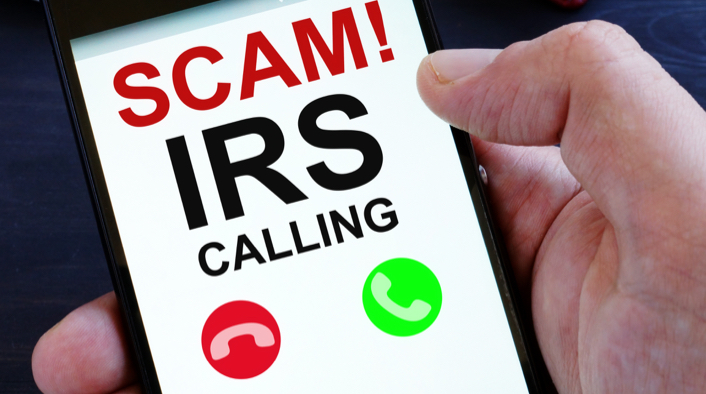Tax-related scams targeting consumers are in full swing during the tax-preparation season. Learn how to avoid these types of scams.

Campus Security Awareness Campaign 2020
This post is part of a larger campaign designed to support privacy, security, and IT professionals as they develop or enhance their security awareness plans. The campaign is brought to you by the Awareness and Training Community Group sponsored by the EDUCAUSE Higher Education Information Security Council (HEISC). View the other monthly blog posts with ready-made content on the awareness campaigns resource page.
As we enter the US tax preparation season, tax-related scams targeting businesses and consumers are in full swing. Phishing, phone scams, and identity theft scams have topped the US Internal Revenue Service (IRS) "Dirty Dozen" list for the past four years. Customize the content below to help campus community members learn about tax-related scams and how to protect themselves.
Get the Word Out
Newsletter or Website Content
With apologies to Benjamin Franklin, nothing in this world can be said to be certain except death, taxes, and tax scams. As we enter the US tax preparation season, scams targeting taxpayers are in full swing. Here are some tips you can follow during tax season to keep scams from taxing you (See what I did there?):
- If you receive an unsolicited phone call from the IRS, treat it with suspicion. The IRS will never use the phone as its first method of contact with you, and it will never make a phone call to demand immediate tax payment. If you receive an unsolicited phone call from the IRS, never share your personal information with the caller. Instead, collect as much information from the caller as possible, such as the reason for the call, case number, and employee badge number. Then, hang up and contact the IRS via the contact information posted on its website, www.irs.gov.
- Treat unsolicited email or text messages from the IRS with suspicion as well. The IRS does not use email, text messages, or social media to discuss issues with taxpayers, and it will never request that you share personal information with the organization via these methods. The IRS initiates contact with taxpayers through mail delivered by the US Postal Service. If you receive an unsolicited electronic communication from the IRS, it is most likely a phishing scam designed to steal your personal information.
- The IRS has rules and procedures that it must follow when it interacts with taxpayers. Signs of a scam include any contact claiming to be from the IRS. Tax scams often involve the following tactics:
- Trying to collect a payment from you or get information from you in an overly aggressive, demanding, or even threatening way.
- Asking you to make a tax payment to any entity other than the US Treasury.
- Asking you to make a tax payment via a gift card or asking you for your credit card number over the phone or via email.
- Threatening to immediately call the police to have you arrested for not paying your taxes.
- If your personal information has been compromised by other entities (like in a data breach that exposes your personally identifiable information), tax scammers may get ahold of that information and use it to file a tax return on your behalf. You might find out that this has happened to you when you go to file your tax return and your return is rejected. If this happens to you, you may be a victim of tax-related identity theft. Tax-related identity theft happens when someone uses a stolen Social Security number (SSN) to file a fraudulent tax return to claim a refund. To investigate the situation, contact the IRS via the contact information posted on its website, www.irs.gov.
- The IRS offers several resources to help you protect your personal information. You can visit Identity Theft Central to learn how to protect yourself and learn what to do if you are a victim of a tax-related scam.
Social Posts
- Protect your SSN all year. Don't share it unless you know exactly who you are sharing it with and why. #taxfraud
- Beat tax scammers by filing your tax returns as soon as you can. #taxfraud
- Receive an email from the IRS? Be suspicious! Report suspicious email phishing scams to [email protected]. #taxfraud
Email Signature
Ask staff to add a tip to their email signature block and link to your institution's privacy page.
Example:
Jane or John Doe
Chief Privacy Officer
XYZ College or UniversityDon't fall victim to an IRS imposter scam. Learn how to protect yourself. [Link "Learn how" to the IRS Imposter Scams Infographic.]
Embed or Share Videos
Resources
- US Federal Trade Commission: IRS Imposter Scams Infographic
- US Internal Revenue Service: Tax Scams/Consumer Alerts
- US Internal Revenue Service: How to Know It's Really the IRS Calling or Knocking on Your Door
- US Internal Revenue Service: Tax Scams - How to Report Them
- US Federal Trade Commission: 10 Things You Can Do to Avoid Fraud
For more information and resources, you can also reference previous EDUCAUSE Review Security Matters Campus Security Awareness Campaign blog posts about privacy.
- April 2019: Whaling, SMiShing, and Vishing…Oh My!
- October 2018: Don't Let a Phishing Scam Reel You In
- April 2016: Don't Get Hooked
For more information about information security governance, compliance, data protection, and privacy programs, please visit the EDUCAUSE Review Security Matters blog as well as the Cybersecurity Program page. Access additional security and privacy awareness resources through the Awareness Campaigns page.
Joanna Lyn Grama is Associate Vice President, Vantage Technology Consulting Group.
© 2020 Joanna Lyn Grama. The text of this work is licensed under a Creative Commons BY-NC-ND 4.0 International License.
